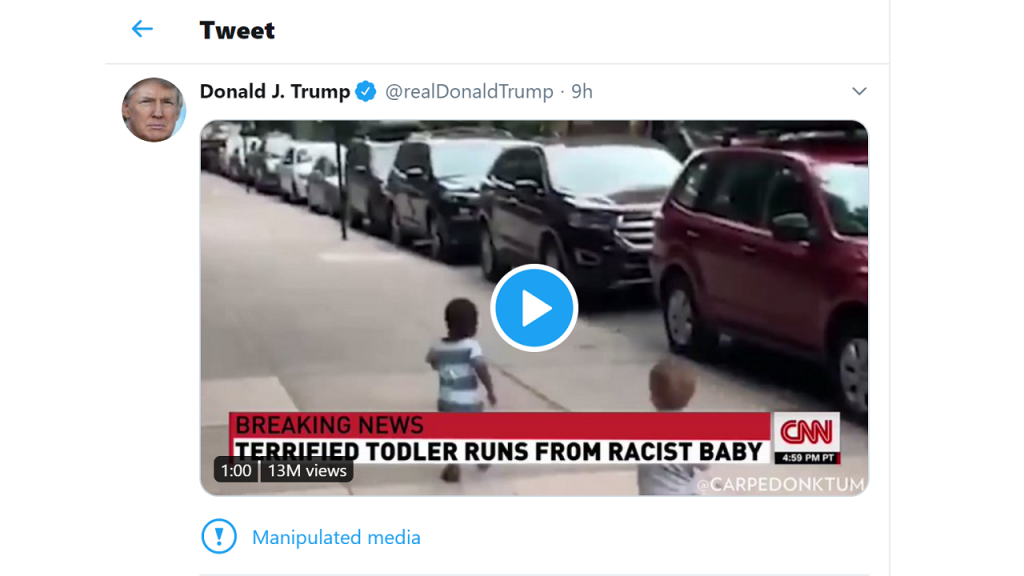Elon Musk’s AI chatbot Grok has once again found itself at the centre of controversy after the most recent update to Grok 3 triggered…
Flagged Trump tweet with manipulated video defended as ‘satire’

Proving that its fact-checking of the US president’s tweets wasn’t a once-off occasion, Twitter has flagged a new tweet by Donald Trump for containing a manipulated video.
However, those defending Trump’s tweet claim that it was satire.
The latest tweet by Trump contains a manipulated video that claims to include footage from CNN with the headline “terrified todler [sic] runs from racist baby”. The next headline says “Racist baby probably a Trump voter”.
The video then ‘fact-checks’ the CNN headline footage by showing the boys in the video actually playing.
— Donald J. Trump (@realDonaldTrump) June 19, 2020
It ends with text saying that “America is not the problem, fake news is”. It adds “Only you can stop the fake news dumpster fires”.
From the typo in the headline to the bold font that falls outside of CNN’s chyron style, the video shows multiple signs of clumsy manipulation. Multiple outlets have debunked the video.
Twitter flagged the tweet with a manipulated video warning. If you click on it, Twitter takes you to a round-up of news stories that debunk the edited video.
At the time of writing, the video had been up 12 hours. The president hasn’t responded to the fact check.
However, he uploaded a campaign video two hours after the fake video.
Rather than a retweet, the president directly uploaded the video.
The latest flag follows a turnaround by some social media companies with regard to Trump’s accounts.
In May, a post by Donald Trump on Twitter was flagged for being misleading regarding mail-in ballots. A few days later, Twitter flagged another tweet for glorifying violence.
Ambiguity, trolling used to defend Trump tweet
Defenders of Trump’s latest tweet say that he shared it ironically, despite the president providing no context or text with the video tweet.
Trump has been criticised in the past for tweeting and retweeting conspiracy theories.
The original video comes from an account called Carpe Donktum. The account’s bio states that it specialises in “the creation of memes to support President Donald J. Trump”.
The account bio also says that they doctored their content, but included the word in quotation marks.
In the wake of the fact check, the account owner said that they specifically badly edit media to satirise mainstream media.
However, Trump’s decontextualised video has attracted mixed reactions. These range from people pointing out the fake video, people viewing the video as real, and people mocking fact-checkers for flagging an “obvious parody”.
But the video’s creator claims that they’re not satirising the irony of sharing fake news to combat fake news. Rather, the creator claims it is a parody of CNN itself. The Twitter account criticised mainstream outlets for issuing fact checks.
CNN: The most trusted name in news.
Also CNN: We had to frantically fact check a meme so that people wouldn't think we called a "todler" racist.
— Carpe Donktum🔹 (@CarpeDonktum) June 19, 2020
Poe’s Law in spreading disinformation
However, this kind of trolling is common in alt-right memes.
As The Guardian noted in 2017, “Experts say that the ‘alt-right’ have stormed mainstream consciousness by weaponising irony, and by using humour and ambiguity as tactics to wrong-foot their opponents.”
This trolling culture simultaneously spreads disinformation and talking points while also claiming it’s a parody.
This ambiguity, known as Poe’s Law, is an effective tool in the spread of disinformation, conspiracies, and ideology.
A 2017 Data & Society Institute report on media manipulation and disinformation noted the use of Poe’s Law to spread right-wing views while using parody as a defence.
“A very successful troll plays with ambiguity in such a way that the audience is never quite sure whether or not they are serious,” the report says.
“This is a key feature of many subcultural spaces, where racist speech and content is bandied around in such a way that it can be read either as the trolling of political correctness or
as genuine racism. Determining intent is often impossible, especially given that participants are most often anonymous.”
So did Trump tweet the video ironically? Probably not — but ambiguity, by design, leaves room for interpretation.


